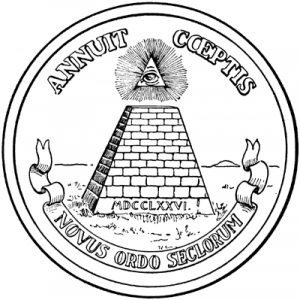Robert Frost once wrote “Two roads diverged in a yellow wood, and sorry I could not travel both.” This opening line to his poem “The Road Not Taken” accurately describes the decision that Masons have continually had to make about how their fraternity operates. One road leads to Masonic collectivism and the other leads to Masonic individualism. These two paths are polar opposites and are rarely examined, even though they have become the prevailing philosophies which Masons champion in order to dictate the direction of the fraternity. The first installment of this series shall consider Masonic collectivism.
Masonic collectivism has been one of the driving philosophies of the fraternity over the past century. Collectivism is defined as being “the political principle of centralized social and economic control, esp. of all means of production.”1 This is a philosophy which requires that Masonry has a single direction and a single goal which the craft as a whole must pursue. It requires that Masonry allows no man to be distinguishable in one characteristic from another man.
Perhaps the most apparent consequence of Masonic collectivism is the cost of Masonry. Collectivists believe in severely limiting the cost of their organization’s operation in order to make Masonry affordable to every man. The collectivist believes that the ego has no place in Masonry and opposes any elitist qualities that the fraternity may exhibit. The collectivist believes that Masonry should be paid for by fund raisers, because every man can work at a fund raiser and the monies deposited to the lodge’s coffer are then the collective product of a collective action.
Collectivism also requires that any mental discourse in Masonry be basic, because Masonic collectivism requires that all men have equal intellect. This leads to the same basic explanations of Masonic history, symbolism, and philosophy to be continually reiterated in Masonic lectures and literature. The individual is not encouraged to pursue studies which may result in distinguishing him from the rest of the fraternity by providing him with a greater knowledge of the order’s teachings. This inevitably leads to the disappearance of educational discourse in the lodge, lest one man become distinguished by being the teacher rather than the student.
Masonic charity is institutionalized so that a central authority controls the distribution of its funds. Rather than relying on the individual to contribute to the charity of other persons in need, the collectivist’s Masonic charity requires the craft to create a charity which contributes to society as a whole. This is to satisfy the requirements of a collectivist organization. Some of the members of a collectivist organization may actually need charity from others, but this would cause those who are in need of charity to be distinguished from those who are not in need. Therefore, it is best to contribute to society as a whole and allow all Brothers to feel like they contributed to the charity equally. Institutionalized charity also creates the image of the fraternity existing for the good of society rather than for the good of its members which satisfies the collectivist’s attitude as well.
Ultimately, collectivism leads not to an organization of individuals, but to a society of dependents. Under this principle of Masonic operation, every Mason can only receive from the fraternity as much as his fellow Brother can give. Because of this, Masonic leaders do not develop their strength through individual talents, but rely on the power gained by being equal with every other member of the fraternity. They depend on the principle that all men are equal in ability and intellect to maintain their position and esteem. It requires that every Mason has the same intentions as every other Mason and that he is made a servant to the direction of the fraternity as a whole. It dictates that Masonry happen only in the controlled confines of the lodge in the manner as prescribed by the masses. If Masonry occurs outside of lodge on an individual basis, then the individual would benefit rather than the organization as a whole.
The collectivist is concerned with the perception of the fraternity in society. He lives only for the benefit of the craft and this requires that his fellow man has a favorable opinion of his institution. The collectivist believes in combating Anti-Masons because without their approval of his selfless endeavor, he can never be satisfied.
Masonic collectivism results in the creation of a lifeless fraternity that cannot fulfill its promise to take a good man and make him better. This is because that motto implies self improvement, but Masonic collectivism dictates that only the good of the whole craft is important and not the improvement of the individual through his personal pursuits. The individual must clip his figurative wings and become a servant to the craft. Collectivism is the model of operation by which Masonry is only concerned with the organization as a whole.
One country is dedicated to the proposition that man has no rights, that the collective is all. The individual held as evil, the mass—as God. No motive and no virtue permitted—except that of service to the proletariat.
Ellsworth Toohey in The Fountainhead by Ayn Rand



A good example of what you are talking about is this:
“The rules, regulations, and diplomatic protocols drive the philosophy – not the other way around.” – Palmetto Bug
The Lexington Libertarian salutes you and ……………………..
Atlas really did shrug, so saith John Galt!!
Pingback: Individualism versus Teamwork | Freemason Information